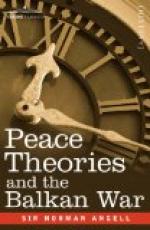Let this matter be quite clear. No one who need be considered in this discussion would think of criticising Lord Roberts for wanting the army, and Mr. Churchill for wanting the navy, to be as good and efficient as possible and as large as necessary. Personally—and I speak, I know, for many of my colleagues in the anti-war movement—I would be prepared to support British conscription if it be demonstrably wise or necessary. But what we criticise is the persistent effort to discredit honest attempts at a better understanding of the facts of international relationship, the everlasting gibe which it is thought necessary to fling at any constructive effort, apart from armament, to make peace secure. These men profess to be friends of peace, they profess to regret the growth of armament, to deplore the unwisdom, ignorance, prejudice and misunderstanding out of which the whole thing grows, but immediately there is any definite effort to correct this unwisdom, to examine the grounds of the prejudice and misunderstanding, there is a volte face and such efforts are sneered at as “sentimental” or “sordid,” according as the plea for peace is put upon moral or material grounds. It is not that they disagree in detail with any given proposition looking towards a basis of international co-operation, but that in reality they deprecate raising the matter at all.[9] It must be armaments and nothing but armaments with them. If there had been any possibility of success in that we should not now be entering upon the 8,000th or 9,000th war of written history. Armaments may be necessary, but they are not enough. Our plan is armaments plus education; theirs is armament versus education. And by education, of course, we do not mean school books, or an extension of the School Board curriculum, but a recognition of the fact that the character of human society is determined by the extent to which its units attempt to arrive at an understanding of their relationship, instead of merely subduing one another by force, which does not lead to understanding at all: in Turkey, or Venezuela, or San Domingo, there is no particular effort made to adjust differences by understanding; in societies of that type they only believe in settling differences by armaments. That is why there are very few books, very little thought or discussion, very little intellectual ferment but a great many guns and soldiers and battles. And throughout the world the conflict is going on between these rival schools. On the whole the Western world, inside the respective frontiers, almost entirely now tends to the Pacifist type. But not so in the international field, for where the Powers are concerned, where it is a question of the attitude of one nation in relation to another, you get a degree of understanding rather less than more than that which obtains in the internal politics of Venezuela, or Turkey, or Morocco, or any other “warlike” state.
And the difficulty of creating a better European opinion and temper is due largely to just this idea that obsesses the Militarist, that unless they misrepresent facts in a sensational direction the nations will be too apathetic to arm; that education will abolish funk, and that presumably funk is a necessary element in self-defence.




